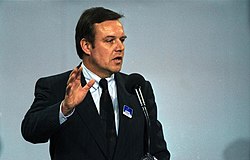Volker Rühe
| Volker Rühe | |
|---|---|
 |
|
| German Federal Minister of Defence | |
|
In office 1 April 1992 – 26 October 1998 |
|
| Chancellor | Helmut Kohl |
| Preceded by | Gerhard Stoltenberg |
| Succeeded by | Rudolf Scharping |
| Member of the German Bundestag | |
|
In office 14 December 1976 – 18 October 2005 |
|
| Personal details | |
| Born |
25 September 1942 Hamburg, Germany |
| Political party | Christian Democratic Union (1963–present) |
| Alma mater | University of Hamburg |
| Occupation | Teacher |
Volker Rühe (born September 25, 1942) is a German politician affiliated to the CDU. He served as German Defence minister from April 1, 1992, succeeding Gerhard Stoltenberg during the first government of a reunified Germany in the fourth cabinet of Chancellor Kohl, to the end of the fifth Kohl Cabinet on October 27, 1998. During his time at the Defence Ministry Rühe played a central role in placing NATO enlargement on the German political agenda. He unsuccessfully ran for the office of minister-president of the German state Schleswig-Holstein in the year 2000, eventually losing against incumbent Heide Simonis.
From 1976 to 2005 Rühe was a member of the German Bundestag. After the Christian Democrats returned to power in 1982, he joined the CDU/CSU parliamentary group’s leadership under its new chairman Alfred Dregger.
Under the leadership of CDU chairman and Chancellor Helmut Kohl, Rühe held the position of Secretary General of his party from 1989 until 1992, including during the period of German reunification. In this capacity, he succeeded Heiner Geissler and was put in charge of administrative matters and electoral tactics. At a party convention in late 1992, the CDU surprisingly replaced Rühe with Heinz Eggert, a representative from East Germany, as one of Kohl's four deputies.
...
Wikipedia
